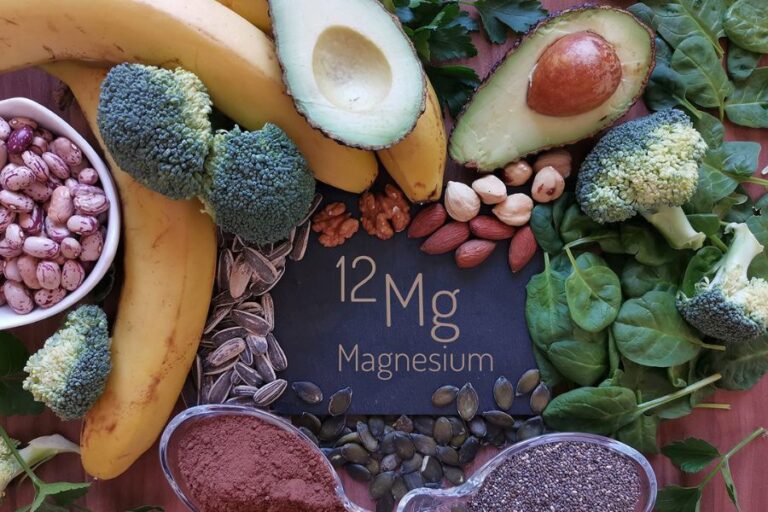Magnesium is an essential mineral that plays a crucial role in maintaining your overall health and well-being. Every cell in your body depends on magnesium to function properly, making it vital for everything from muscle movements to heart rhythms. Despite its significance, many people don’t consume enough magnesium through their diet, often leading to deficiencies that can affect health. Understanding the benefits of magnesium can help you ensure you’re getting adequate amounts to support your body’s daily needs.
What Is Magnesium?
Magnesium is an essential mineral involved in over 300 biochemical processes in your body. It supports nerve function, muscle contractions, heart rhythms, and bone health. Your body cannot produce magnesium naturally, making it necessary to get enough through diet or supplements.
Foods naturally rich in magnesium include leafy green vegetables such as spinach and kale, nuts like almonds and cashews, seeds including pumpkin and chia, whole grains, legumes, avocado, and dark chocolate. Supplements are also commonly used to boost magnesium intake, particularly in people whose diets lack sufficient amounts or who have specific health conditions requiring additional support.

Health Benefits of Magnesium
1. Supports Muscle Function
Magnesium plays a key role in muscle health, helping your muscles contract and relax smoothly. When magnesium levels are adequate, muscle cramps, spasms, and stiffness decrease significantly. Athletes and active individuals often use magnesium supplements to enhance muscle recovery and performance because magnesium helps reduce inflammation and soreness after exercise. Ensuring sufficient magnesium intake can help you maintain comfortable movement and better overall physical performance.
2. Promotes Heart Health
Magnesium is vital for maintaining heart health and a regular heartbeat. It helps manage your heart rhythm by regulating the electrical signals that control heartbeat patterns. Proper magnesium levels support healthy blood pressure, reducing the risk of hypertension and associated cardiovascular issues. Studies suggest that individuals who consistently get enough magnesium through diet or supplements have a lower risk of heart disease, stroke, and other cardiovascular conditions. Including magnesium-rich foods in your diet can significantly contribute to your long-term heart health.
3. Improves Bone Strength
Magnesium is essential for maintaining strong, healthy bones. It helps your body absorb calcium effectively, directly influencing bone density and overall skeletal health. Low magnesium levels have been linked to increased risks of osteoporosis and bone fractures. Ensuring an adequate magnesium intake helps protect your bones as you age, lowering the likelihood of developing brittle bones and bone loss. Eating magnesium-rich foods and taking supplements when necessary can help you maintain better bone health throughout life.
4. Enhances Sleep Quality
Magnesium significantly improves sleep quality by calming your nervous system and regulating key sleep-related hormones, such as melatonin. Adequate magnesium intake is associated with deeper, more restful sleep and fewer occurrences of insomnia. Many people use magnesium supplements specifically for sleep improvement, finding that it helps reduce nighttime awakenings and promotes a relaxed state before bedtime. Incorporating magnesium-rich foods or supplements into your evening routine can effectively support healthier sleeping patterns and overall restfulness.
5. Reduces Stress and Anxiety
Magnesium naturally calms your nervous system, helping reduce stress and anxiety levels. It plays an essential role in regulating neurotransmitters, which are chemical messengers that influence mood, relaxation, and emotional stability. When magnesium levels are sufficient, feelings of anxiety, nervousness, and irritability can decrease notably. Regular consumption of magnesium-rich foods or supplements supports emotional balance, helping you manage stress more effectively and improving your overall mental well-being.
6. Regulates Blood Sugar Levels
Magnesium helps regulate blood sugar by enhancing insulin sensitivity, which allows your body to use glucose effectively. Adequate magnesium intake has been linked to lower risks of developing type 2 diabetes and improved control over blood sugar levels in individuals who already have diabetes. Magnesium supports glucose metabolism and insulin production, contributing to stable energy throughout the day. Eating magnesium-rich foods or taking supplements can play a critical role in maintaining healthy blood sugar levels, particularly for those at risk of insulin resistance or diabetes.
7. Boosts Energy Levels
Magnesium is essential for energy production within your cells. It helps convert the food you eat into usable energy, fueling daily activities and reducing fatigue. When your magnesium levels are low, you may feel tired or sluggish, making everyday tasks more challenging. By ensuring adequate magnesium intake, you support efficient cellular energy processes, keeping your energy levels stable and helping you feel more alert and productive throughout the day. Regularly consuming magnesium-rich foods or supplements can make a noticeable difference in combating fatigue and enhancing overall vitality.
8. Supports Digestive Health
Magnesium plays a valuable role in maintaining digestive health by supporting regular bowel movements and relieving constipation. It acts as a natural laxative by attracting water into the intestines, softening stools, and making them easier to pass. Magnesium also assists digestive enzymes in efficiently breaking down nutrients, enhancing overall gut function. Regular consumption of magnesium-rich foods or supplements can help promote comfortable digestion and prevent common digestive complaints such as bloating and irregularity.
9. Alleviates Migraines and Headaches
Magnesium has been found effective in reducing the frequency and severity of migraines and headaches. It works by relaxing blood vessels and reducing inflammation in the brain, addressing two common causes of migraines. Many individuals experiencing chronic headaches or migraines have lower magnesium levels, making supplementation particularly beneficial. Studies have demonstrated that regular magnesium intake can lead to fewer migraines and less intense pain episodes. Increasing your magnesium consumption, either through diet or supplements, can provide noticeable relief for migraine sufferers.

Recommended Daily Intake of Magnesium
The recommended daily intake of magnesium varies by age, sex, and life stage. For adult men, the general guideline is around 400–420 mg per day. Adult women typically need 310–320 mg daily, with slightly higher needs during pregnancy and breastfeeding.
Most people can meet their magnesium needs through a balanced diet that includes leafy greens, nuts, seeds, whole grains, and legumes. However, certain individuals—such as athletes, older adults, or those with health conditions like diabetes or gastrointestinal disorders—may benefit from magnesium supplements. Consulting with a healthcare provider can help determine the appropriate intake for your individual needs.
Signs of Magnesium Deficiency
Magnesium deficiency can develop gradually and may present with a range of symptoms. Common signs include muscle cramps, fatigue, weakness, and irritability. Some people may also experience numbness, abnormal heart rhythms, or frequent headaches. Chronic low magnesium levels can increase the risk of more serious health issues, such as high blood pressure, osteoporosis, and type 2 diabetes.
Those most at risk for deficiency include individuals with gastrointestinal disorders, people who consume excessive alcohol, older adults, and those taking certain medications like diuretics or proton pump inhibitors. Recognizing these signs early can help you take steps to restore healthy magnesium levels through diet or supplements.
How to Safely Increase Magnesium Intake
To safely raise your magnesium levels, start by focusing on food. Leafy greens, nuts, seeds, legumes, whole grains, and fish are all excellent sources. Incorporating a variety of these foods into your meals can help you meet your daily needs without relying on supplements.
If your diet falls short or you have higher magnesium requirements, supplements can be effective. Magnesium citrate, glycinate, and oxide are common forms, each with different absorption rates and digestive effects. It’s best to start with a low dose and increase gradually, as high amounts can cause diarrhea. Speak with a healthcare provider before starting supplements, especially if you take medications or have existing health conditions.
Possible Side Effects and Precautions
While magnesium is generally safe when consumed through food, excessive intake from supplements can cause side effects. The most common is diarrhea, especially with forms like magnesium oxide or magnesium citrate. Other potential effects include nausea, abdominal cramping, and, in rare cases, irregular heartbeat or low blood pressure if intake is extremely high.
People with kidney disease should be especially cautious, as their bodies may struggle to eliminate excess magnesium, increasing the risk of toxicity. Magnesium can also interact with certain medications, including antibiotics and diuretics. To avoid complications, always follow dosage guidelines and consult a healthcare provider before beginning supplementation.
Conclusion
Magnesium supports many vital processes in your body, from muscle function and heart rhythm to energy production and mental health. It also plays a key role in improving sleep, managing blood sugar, supporting digestion, and maintaining strong bones. Despite its importance, many people do not get enough magnesium through diet alone.
By eating magnesium-rich foods and using supplements when necessary, you can help protect your long-term health and reduce the risk of deficiency-related problems. Monitoring your intake and recognizing early signs of low magnesium can help you maintain steady levels and enjoy the full range of its benefits.
Frequently Asked Questions About Magnesium
What are the best food sources of magnesium?
Some of the best sources include leafy green vegetables (like spinach and kale), almonds, cashews, pumpkin seeds, black beans, quinoa, brown rice, avocados, and dark chocolate.
How do I know if I’m deficient in magnesium?
Common signs of deficiency include muscle cramps, fatigue, poor sleep, irritability, and headaches. A blood test can confirm low magnesium levels, but symptoms often appear before it’s detected.
Can I take magnesium supplements every day?
Yes, many people take daily magnesium supplements. However, it’s best to consult a healthcare provider before starting, especially if you’re on medication or have a health condition.
Which type of magnesium supplement is most effective?
Magnesium glycinate is well-absorbed and gentle on the stomach, making it a popular choice. Magnesium citrate is also effective, particularly for digestion and constipation relief.
Can magnesium help with anxiety and sleep?
Yes, magnesium helps regulate neurotransmitters and hormones that affect mood and sleep. Many people find it helpful for managing stress and improving sleep quality.
Is it possible to take too much magnesium?
Yes. High doses from supplements can cause diarrhea, nausea, or more serious side effects in people with kidney issues. Stick to the recommended dosage unless advised otherwise by a healthcare professional.
Does magnesium interact with medications?
Magnesium can interact with certain medications, including antibiotics, diuretics, and medications for osteoporosis or heart conditions. Always check with your doctor before combining magnesium supplements with prescriptions.
References
- MegaFood. (n.d.). The benefits of magnesium. MegaFood.
- Piuri, G., Zocchi, M., Della Porta, M., Ficara, V., Manoni, M., Viglio, S., Cappelletti, G., & La Ferla, B. (2021). Magnesium in obesity, metabolic syndrome, and type 2 diabetes. Nutrients, 13(1), 320.
- Wani, A. L., Ara, A., & Usmani, J. A. (2022). Magnesium and human health: Perspectives and research directions. International Journal of Molecular Sciences, 23(17), 9561.
- Veronese, N., Demurtas, J., Pesolillo, G., Cagnin, A., Smith, L., Dominguez, L. J., Barbagallo, M., & Maggi, S. (2024). Magnesium and depression: A systematic review. Nutrients, 16(2), 250.
- Gröber, U., Schmidt, J., & Kisters, K. (2015). Magnesium in prevention and therapy. Nutrients, 7(9), 8199–8226.
- DiNicolantonio, J. J., O’Keefe, J. H., & Wilson, W. (2018). Subclinical magnesium deficiency: A principal driver of cardiovascular disease and a public health crisis. Open Heart, 5(1), e000668.
- Long, S., Romanchuk, T., Wang, Y., & Yang, Y. (2021). Comparative absorption of magnesium salts in human intestinal Caco-2 cells. Biometals, 34, 1303–1313.
- National Center for Biotechnology Information. (n.d.). Magnesium glycinate. PubChem, Compound Summary for CID 23682535.









